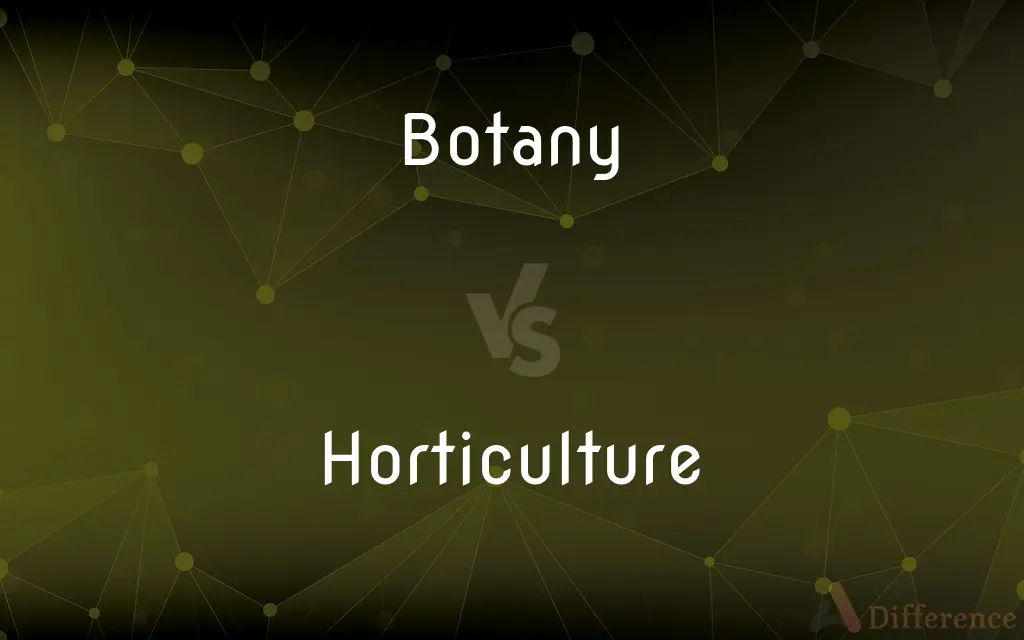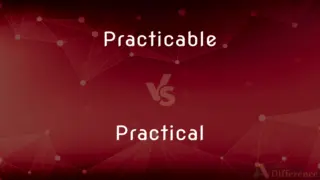Botany vs. Horticulture — What's the Difference?
By Tayyaba Rehman — Updated on October 9, 2023
Botany is the scientific study of plants; Horticulture is the art and science of cultivating and managing gardens.

Difference Between Botany and Horticulture
Table of Contents
ADVERTISEMENT
Key Differences
Botany delves into the study of plants at a cellular, genetic, and ecological level, seeking to understand the biology and physiology of various plant species. Horticulture, on the other hand, focuses on the cultivation and management of plants, ensuring their optimal growth in gardens, greenhouses, or orchards. Both Botany and Horticulture appreciate the beauty and complexity of plants, but while Botany tends to be more research-oriented, Horticulture is application-driven.
Botany is a broad scientific discipline, encompassing fields like plant taxonomy, ecology, and phytochemistry. Horticulture, in contrast, specializes in the breeding, cultivation, and maintenance of ornamental and edible plants. While both Botany and Horticulture intersect in their reverence for plants, Botany explores plants' innate workings and evolutionary histories, whereas Horticulture navigates their practical use and aesthetic arrangement in human-made settings.
In Botany, professionals often conduct experiments to understand plant growth, genetics, or interactions with their environment. In Horticulture, professionals might create new plant varieties, design gardens, or find optimal cultivation techniques for specific species. Botany and Horticulture, although closely related, serve distinct purposes; Botany unravels the mysteries of plant life, and Horticulture leverages this knowledge to enhance human environments.
Botanists are typically involved in academic or field research, seeking to answer questions about plant biology or ecology. Horticulturists, on the other hand, work in varied settings like nurseries, botanical gardens, or landscaping firms, guiding the cultivation and arrangement of plants. While Botany provides the foundational knowledge of how plants function and evolve, Horticulture applies this knowledge to grow plants beneficially and aesthetically.
Comparison Chart
Focus
Scientific study of plants
Cultivation and management of gardens
ADVERTISEMENT
Application
Research-oriented
Practical and aesthetic-oriented
Scope
Broad, including genetics, ecology, taxonomy
Specialized in breeding, cultivation, maintenance
Professionals' role
Conducting experiments, academic research
Designing gardens, breeding plants, cultivation
End result
Understanding plant life's intricacies
Enhancing environments with optimal plant arrangements
Compare with Definitions
Botany
Botany is the scientific study of plant life.
Her interest in botany led her to discover a new species of fern.
Horticulture
Horticulture is the art and science of cultivating gardens.
His expertise in horticulture transformed the barren land into a lush garden.
Botany
Botany investigates the internal workings of plants.
Advances in botany have improved our understanding of photosynthesis.
Horticulture
Horticulture deals with the breeding of ornamental and edible plants.
Horticulture techniques have given us sweeter, juicier fruits.
Botany
Botany seeks to categorize and understand plant diversity.
Her botany research focused on the flora of the Amazon rainforest.
Horticulture
Horticulture aims for optimal plant growth in cultivated settings.
The horticulture class taught students about soil pH and plant nutrition.
Botany
Botany examines plants at cellular and molecular levels.
The botany department has state-of-the-art microscopy facilities.
Horticulture
Horticulture is the art of cultivating plants in gardens to produce food and medicinal ingredients, or for comfort and ornamental purposes. Horticulturists are agriculturists who grow flowers, fruits and nuts, vegetables and herbs, as well as ornamental trees and lawns.The study and practice of horticulture have been traced back thousands of years.
Botany
Botany encompasses plant taxonomy, physiology, and ecology.
The botany lecture covered the evolutionary history of mosses.
Horticulture
The science or art of cultivating fruits, vegetables, flowers, or ornamental plants.
Botany
Botany, also called plant science(s), plant biology or phytology, is the science of plant life and a branch of biology. A botanist, plant scientist or phytologist is a scientist who specialises in this field.
Horticulture
The cultivation of a garden.
Botany
The science or study of plants.
Horticulture
The art or science of cultivating gardens; gardening.
Botany
A book or scholarly work on this subject.
Horticulture
Small-scale agriculture.
Botany
The plant life of a particular area
The botany of the Ohio River valley.
Horticulture
The cultivation of a garden or orchard; the art of cultivating gardens or orchards.
Botany
The characteristic features and biology of a particular kind of plant or plant group.
Horticulture
The cultivation of plants
Botany
(uncountable) The scientific study of plants, a branch of biology. Typically those disciplines that involve the whole plant.
Horticulture
Horticulture involves the practical application of botanical knowledge.
With a background in botany, she excelled in horticulture, creating vibrant landscapes.
Botany
The plant life of a geographical area; flora.
The botany of Greenland
Horticulture
Horticulture merges aesthetic considerations with plant cultivation.
Her horticulture designs always considered color coordination and seasonal blooms.
Botany
The properties and life phenomena exhibited by a plant, plant type, or plant group.
Botany
(countable) A botanical treatise or study, especially of a particular system of botany or that of a particular place.
Botany
The science which treats of the structure of plants, the functions of their parts, their places of growth, their classification, and the terms which are employed in their description and denomination. See Plant.
Botany
A book which treats of the science of botany.
Botany
The branch of biology that studies plants
Common Curiosities
What is the primary aim of botany?
Botany aims to understand the biology, physiology, and taxonomy of plants through scientific study.
Do botanists and horticulturists work together?
Yes, they often collaborate, with botanists providing scientific insights and horticulturists applying them practically.
How has botany influenced horticulture?
Botany provides foundational knowledge about plants, which horticulture then applies to optimize cultivation and design.
How do horticulturists improve plant varieties?
Horticulturists use breeding techniques, often leveraging botanical research, to develop improved or novel plant varieties.
What role does horticulture play in urban settings?
Horticulture enhances urban environments through landscaping, urban gardens, and green spaces, promoting biodiversity and aesthetics.
Can botany help combat climate change?
Yes, botany provides insights into plants' roles in carbon sequestration, habitat preservation, and ecosystem balance.
Can someone specialize in both botany and horticulture?
Absolutely, having knowledge in both areas can be beneficial for comprehensive plant study and cultivation.
Are there job opportunities in both fields?
Yes, botanists often work in research or academia, while horticulturists might work in nurseries, landscaping, or botanical gardens.
How does horticulture differ in its approach?
Horticulture focuses on the practical cultivation, management, and arrangement of plants in gardens and other cultivated settings.
Why is botany important for environmental conservation?
Botany helps understand plant ecology, evolution, and interactions, vital for conservation efforts.
How do horticulturists address plant diseases?
Horticulturists use integrated pest management, leveraging botanical research to tackle diseases and pests.
Is horticulture limited to ornamental plants?
No, horticulture also encompasses the cultivation of fruits, vegetables, and other edible plants.
How has technology impacted botany?
Technology has advanced botany through tools like molecular genetics, remote sensing, and advanced microscopy.
Are there specific educational paths for both botany and horticulture?
Yes, universities often offer specialized degrees and courses in both botany and horticulture.
Can botany insights help address food scarcity?
Yes, botany can guide the development of crop varieties that are more resilient, nutritious, or high-yielding.
Share Your Discovery

Previous Comparison
Practicable vs. Practical
Next Comparison
Rug vs. RagAuthor Spotlight
Written by
Tayyaba RehmanTayyaba Rehman is a distinguished writer, currently serving as a primary contributor to askdifference.com. As a researcher in semantics and etymology, Tayyaba's passion for the complexity of languages and their distinctions has found a perfect home on the platform. Tayyaba delves into the intricacies of language, distinguishing between commonly confused words and phrases, thereby providing clarity for readers worldwide.
















































